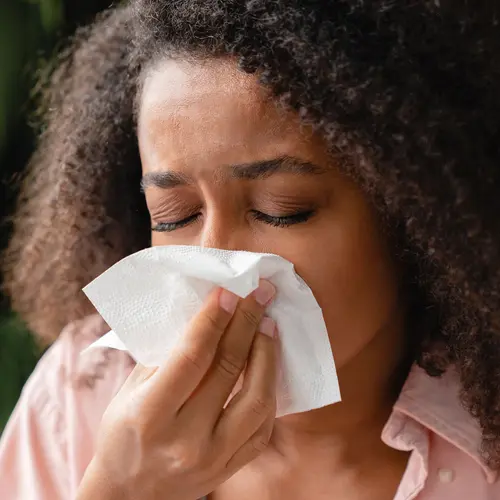Allergies News
- Xolair a New Weapon Against Food Allergies, but Questions Remain
March 4, 2024 — An old drug offers new tricks for people with multiple food allergies, but costs and access issues could limit its use.
- Are No-Spray Christmas Trees Better for You? What to Know
December 8, 2023 — What to know about no-spray Christmas trees, which may have health and environmental benefits compared to traditional trees that are often sprayed with pesticides.
- Can a Toothpaste Help Protect Adults Allergic to Peanuts?
November 16, 2023 — In an early trial phase, all the people in a study tolerated even the highest dose of peanut protein in a toothpaste designed to desensitize allergic patients
- First Nasal Spray Alternative to EpiPen Needs More Study: FDA
September 20, 2023 — The FDA has requested further study before approving a nasal spray version of the allergic reaction medicine epinephrine.
- Cases of Meat Allergy Linked to Tick Bites on the Rise: CDC
July 28, 2023 — The CDC is calling for more health care providers to become educated about alpha-gal syndrome, an allergy caused by tick bites that may have affected up to 450,000 people in the United States.
- Food Allergies Affect People of Color More than White People
June 15, 2023 — A new study found that people of color have more food allergies than white people and that lower-income people are also more affected by food allergies.
- Dogs, Cats Could Lower Children's Allergy Risk
March 29, 2023 — A study finds that exposure to indoor cats and dogs in utero or early infancy leads to fewer allergy cases in children. Over 65,000 children were tested, and 22% who were exposed to pets had fewer food allergies than those who were not tested.
- Achoo! Pollen Seasons Are Getting Longer
March 8, 2023 — Climate change has caused temperatures to rise in 203 American cities since 1970, contributing to longer allergy seasons in more than 170 of them, the report by Climate Central says. Some areas of the country see first blooms weeks earlier.
- Weather Report: Cold, Then Hot, With Chance of a Runny Nose
February 24, 2023 — Recent extreme swings in temperature and weather across the U.S. can trigger health issues for many people, such as allergies, infections, or worsened heart conditions.
- Sesame Added to FDA’s Allergen Labeling Guidelines
January 4, 2023 — The federal government has added sesame to its list of major food allergens, which already includes milk, eggs, peanuts, and other dietary staples. Foods containing sesame must follow regulatory requirements on labeling and manufacturing.
- Nasal Spray for Allergies Now Available Without a Prescription
July 12, 2022 — According to the product’s website, the medication costs anywhere from $15.99 to $24.99 at Target stores across the country.
